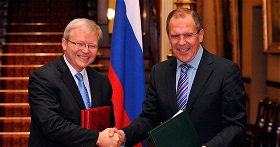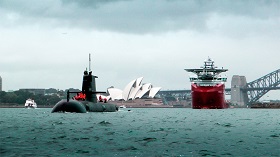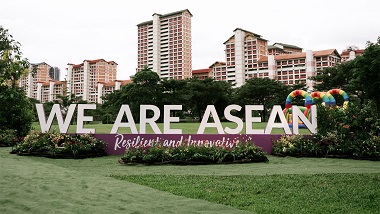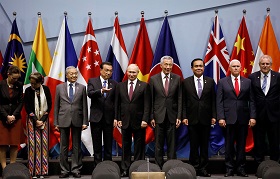What are the features of Australia’s approach to the conception of Indo-Pacific? What perspectives does Australia see for the Quad? Is China mainly a partner or a competitor to Australia? What place should Russia take in world politics? His Excellency Mr Peter Tesch, Ambassador of Australia to the Russian Federation, shares his thoughts on these and other issues.
Today some countries such as Indonesia, Japan, US, Australia offer the conception of Indo-Pacific. Can you explain the features of the Australian conception? Is it a big difference between US and Australian approaches in this field?
In terms of geographical focus, the Australian conception ranges from the Indian Ocean to the Pacific Ocean. It includes a particular focus on India, North Asia and the United States, with Southeast Asia and ASEAN at its heart. In terms of policy, our central focus is to promote an open, inclusive and prosperous Indo–Pacific, in which the rights of all states are respected. To that end, we are enhancing cooperation with major democracies in the region — including India and Indonesia — and doing all we can to cement our position as a leading security, economic and development partner for Southeast Asian and Pacific countries.
It is a term that makes a lot of sense for us, because it reflects our geographic and strategic reality. We have been using it for quite a while, including in our 2016 Defence White Paper and 2017 Foreign Policy White Paper, but prior to that too.
I cannot really talk for the US conception — that is for US diplomats or commentators. What I can say is that our two conceptions are in many ways complementary, in that we both wish to see a region based on principles of openness, inclusivity and prosperity, where disputes are resolved without the threat or use of force or coercion. Our conception makes clear our abiding interest in deep US engagement that helps shape such a region; and, it must be noted, in constructive engagement with China to the same end.
We are also very focussed on strengthening ties with regional countries like China, Indonesia, India, Japan, Singapore, Papua New Guinea and many others. Our conception also places a heavy emphasis on regional cooperation through institutions such as the East Asia Summit and economic integration through initiatives like the Regional Comprehensive Economic Partnership.
What do you think about perspectives of the Quad (Australia, Japan, US and India)?
Australia is strongly committed to the Quad. We see it as a valuable strategic dialogue between like-minded democracies based on their shared vision for prosperity and security in the Indo-Pacific. Working with partners — including India, Japan and the United States — to shape an open, inclusive and prosperous Indo-Pacific is a central objective of Australia’s 2017 Foreign Policy White Paper.
Senior foreign affairs officials from the four countries have met three times, most recently in November 2018. Officials have discussed a range of strategic challenges facing the Indo-Pacific region, and focused on their shared goals and areas for practical cooperation, including in maritime, counter-terrorism, non-proliferation and on cyber issues, as well as on principles-based and sustainable infrastructure development.
Engagement through the Quad is just one part of Australia's active diplomacy in the Indo-Pacific. We view the Quad as a complement to our bilateral, trilateral and other regional efforts. In many ways, the Quad is an extension of existing trilateral arrangements (Australia — Japan — US, Australia — India — Japan, India — Japan –US), and it is natural that Australia would work with like-minded countries in such arrangements. Other countries also pursue minilateral engagement. Russia, for instance, engages in minilateral processes, including the BRICS, China-Russia-India and China — Russia — Mongolia.
The Quad also complements the role of the Association of Southeast Asian Nations (ASEAN) and ASEAN-led regional architecture, such as the East Asia Summit. As committed ASEAN dialogue partners, all four Quad countries are strong supporters of ASEAN-centrality.
China is strengthening its position in the Indo-Pacific and Oceania. At the same time, Australia has very developed ties with China. What do you think: is China mainly a partner or a competitor to Australia?
China is an important partner for Australia, and one with which we share a wide range of mutual interests.
We have regular, high-level engagement with China, and are always looking for ways to strengthen our Comprehensive Strategic Partnership. Foreign Minister Payne visited China in November last year for the 5th Australia-China Foreign and Strategic Dialogue, hosted by Foreign Minister Wang Yi, and our Defence Minister, Christopher Pyne, visited Beijing in January this year.
There’s plenty of statistics to show how important China is to us on the economic front, and vice versa. For a number of years China has been our largest individual two-way goods and services trading partner, accounting for around 25 per cent ($194.6 billion) in 2017 — 2018. China is also our fifth largest foreign investor, and its portfolio is growing and diversifying. People-to-people links are strong — in 2017 we hosted around 185,000 Chinese students, and 1.4 million tourists. And believe it or not, Chinese is now the second most spoken language in Australia after English.
Of course, as with any relationship, we have areas of disagreement and contestation. For that reason, it is important for us that we are able to engage China constructively when we need to. Just as we want US engagement that builds openness, inclusivity and prosperity, we want to see a China that enhances stability, reinforces international law and respects the interests of smaller countries.
As for China’s role in the Pacific (Oceania), we recognise that other partners have an important role in meeting the significant development challenges in our region. Naturally, like Australia, many Pacific governments pursue relationships with China given its economic weight and global significance. Australia has been clear that we welcome all investment that supports sustainable development in line with the priorities and ambitions of Pacific island countries, is delivered transparently, and does not impose heavy debt burdens. As the region’s major development partner, Australia is committed to greater cooperation and coordination with all other development partners, including China, to maximise opportunities for all communities in the Pacific to reach their potential. Our partnerships in the Pacific matter to us independent of what China and others are doing as we are part of the region.
We see a big tension between the US and China. How does this situation influence on China-Australia relations?
The growing competition between the United States and China is influencing every country, not just Australia. As Prime Minister Scott Morrison said at the G20 Summit in Buenos Aires last November, “we cannot pretend that ongoin¬g trade tensions do not pose real threats to the global economy.”
We have publicly acknowledged the concerns of the US and others about some Chinese trade and investment practices, including protection of intellectual property and the rules governing the involvement of government entities in markets. For sure, these need to be resolved, but no one wins from a trade war. The unilateral imposition of tariffs is a poor precedent for international economic cooperation. We continue to encourage both sides to resolve their differences in a way that is WTO-consistent and non-discriminatory. The WTO remains a pivotal organisation for the international trading system and we hope to work with others to reform and strengthen it.
One unfortunate consequence of the growing US-China tensions is that it overshadows and distracts attention from important regional initiatives. When we look at our region, and at the work of ASEAN in particular, we can see that a lot has been achieved on regional economic integration, and that there is still much more to be done. In the past few decades we have also witnessed, and helped drive, an uptick in regional cooperation to manage transnational threats such as piracy, counter-terrorism and pandemics, among other things.
It is fairly straightforward for us: Australia’s economic and security interests are best served by deepening regional economic integration. ASEAN’s success has been a big part of that. In 2016, our trade with ASEAN countries — taken together — was greater than with the United States.
In the Foreign Policy White Paper 2017, we see that Australia positions itself as a regional power with global interests. So how does Canberra implement its role as a regional power these days?
I think the ‘regional power with global interests’ characterisation is useful shorthand for explaining our interests and our approach. Implicit in the emphasis on the ‘regional’ is the fact that our economic interests are very much linked to rising prosperity in China, India and Southeast Asia. This also refers to the positive leadership role we have assumed in Southeast Asia and the Pacific, particularly through the promotion of regional institutions, economic growth and trade, and the partnership model that underpins our development assistance program.
‘Global interests’ refers to a number of things, including our interest in maintaining and building upon the global economic institutions that have worked so well to date, such as the World Trade Organisation. It can also refer to the fact that Australia has for some time made a significant contribution in treasure and blood to international security in areas far from our home region — in the Middle East and Afghanistan in particular. It also refers to our active engagement in multilateral diplomacy, including on key international security regimes.
In terms of how do we go about ‘implementing our role’, I think the word ‘partnership’ is key. We pride ourselves on our diplomacy and our ability to engage and develop mutually beneficial outcomes with our partners in the region and further afield. We seek to empower other countries to succeed, which is in our interests. Whether that be training Iraqi or Afghani security forces, strengthening ASEAN cohesion and effectiveness, or developing programs with Pacific Island countries to establish sustainable models to drive economic growth.
And as is evident from the chapter headings listed within the White Paper itself, ‘global interests’ also refers to the myriad shared challenges we all face: terrorism, transnational organised crime, technological change, cyber security, urbanisation, climate change, food, energy and water security, security in space, and so on.
Trump demonstrates his negative attitude towards globalization, free trade and has adopted some protectionist measures. What do officials in Canberra think about this?
Well, as laid out in our Foreign Policy White Paper, “we must guard against protectionism”, and this is a fundamental principle for us. We have hugely benefited from open trade and investment frameworks. And as an open and trade-exposed economy we are equally vulnerable to any trend in the opposite direction. For this reason, our officials and ministers are pro-active in engaging the US, China and others, as well as through forums like the G20, to ensure that protectionist policies do not win the day.
I’d note that our Foreign Minister, Marise Payne, was in Washington for the ‘Australia-US Dialogue on Cooperation in the Indo-Pacific’ on 29 January, where she spoke of a number of ‘interlocking approaches’ between Australia and the United States. This included ‘support for an open integrated regional economy’ and ‘a strong, productive relationship with China’. She also said it was in our shared interests that rising geopolitical tension did “not jeopardise the long period of stability and growth that the Indo-Pacific has experienced, which has lifted hundreds of millions out of poverty to the benefit of us all”.
Minister Payne also highlight the fact that Australia and 10 other countries had recently finalised the Trans Pacific Partnership (TPP — 11), and she registered the point that we would welcome discussions with the US if ever there was a change of position. You may recall that pre-election, President Trump made a political commitment in the election campaign to pull out of the TPP — as did Hillary Clinton, by the way — and he delivered on the third day of his presidency. But this does not mean it will never be in the interests of the United States to reengage through such a trade deal.
What kind of global governance could we expect in 10–15 years? What powers will determine the future world order in your opinion? And what place should Russia take?
I would like to think that we will see continued strong international cooperation and properly functioning global governance on key concerns.
Despite the current deterioration in relations between the United States and Russia, and tensions between the United States and China, global cooperation on international security remains important, whether that be on counter terrorism, regulating nuclear, chemical and other weapons of mass destruction, or engaging sensibly on cyber security or security in space.
Clearly there will need to be plenty of focus and effort by all sides in the coming months and years to ensure that existing regimes are not undermined, which benefits nobody. And where agreements do fall short of expectations, all countries should work hard to improve upon them.
We recognise that Russia continues to be a major player in vital international security mechanisms . Preserving and strengthening the hard-fought international arrangements serves the interests not just of Australia, but of all countries. Irrespective of the current deterioration and diminished levels of trust in relations with the US, we would hope that Russia will play a constructive role into the future.
Under what circumstances can relations between Russia and Australia be improved?
We would first need to see some genuine improvement in relations between Russia and Ukraine, which does not seem particularly likely in the short term. As you may be aware, we have targeted financial sanctions and travel bans on individuals and entities instrumental to Russia’s purported annexation of Crimea in March 2014, and support of pro-Russian separatists in eastern Ukraine. In return, Russia has banned the import of specific agricultural products from Australia and other countries. Unfortunately, this has seen two-way merchandise trade drop from A$1.837 billion in 2014 to just under half of that, at A$903 million.
But we can, and should, engage constructively where it is in our interests to do so. In this respect, our two countries engage in a number of important international and multilateral fora, including those involved with non-proliferation issues and regional security, such as the East Asia Summit.
As you may be aware, Australia is also committed to pursuing accountability for the downing of MH17 in July 2014, and to achieving justice for the victims and their loved ones. Our aim is to find the truth of the circumstances surrounding the downing, ensure such conduct will not be repeated, and to seek reparations to achieve justice for the victims. To this end along with our Dutch counterparts we are engaging Russian officials on the circumstances leading to the tragic loss of innocent lives, and we expect all to engage constructively in these negotiations. But we do not want to pre-empt the outcome of these negotiations.
Interviewed by Anastasia Tolstukhina, RIAC Website Editor.








